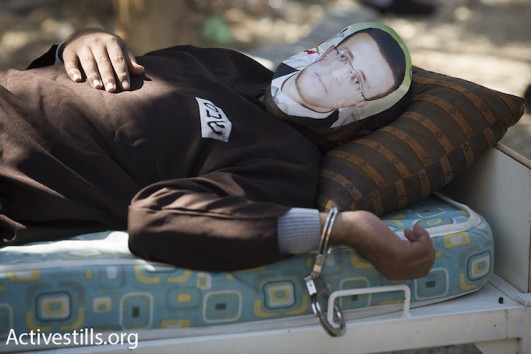The Beersheba District Court also ruled that Bilal Kayed, who has been hunger striking for 58 days, will be prevented from seeing his doctor, citing ‘adequate’ treatment he receives at Ashkelon’s Barzilai hospital.

The Beersheba District Court decided in a precedent ruling that Bilal Kayed, a hunger-striking Palestinian administrative detainee, would be prevented from seeing his doctor.
The court also ruled that he would remain handcuffed to his bed, and accused Physicians for Human Rights (PHR), the organization that represented him, that they petitioned in bad faith.
Kayed went on a hunger strike 58 days ago to protest his extrajudicial detention, which could be extended indefinitely. On July 17, he was hospitalized at Ashkelon’s Barzilai Medical Center after his health deteriorated.
In hospital, despite his poor health, he was handcuffed to his bed and guarded 24/7. In addition, he made a request to see his own doctor, but was refused by the Israel Prisons Service (IPS). Kayed’s unsuccessful petition was against these two provisions. His lawyers said he would appeal.
Hidden agenda
The court upheld IPS’ assessment that he might escape or be smuggled out, because the window in his ground-floor room has no bars.
In coming to assess the detainee’s risk, the court relied in this case – as in all administrative detentions – on classified reports, to which the detainee and his lawyers have no access. It was to protest this injustice that Kayed started hunger striking.
As for Kayed’s request to see his doctor, the judge ruled that it would be unnecessary because he receives “adequate” medical attention. He stated that Barzilai’s medical staff are “experienced” in treating Palestinian hunger strikers, and that he receives regular visits of the Red Cross. On this basis, the judge ruled that a second opinion is not indispensable.
“It is hard not to believe that the petition wasn’t motivated by a genuine concern for the petitioner’s health, but a hidden agenda that does not belong in court,” he wrote. “I have come to the conclusion that the request to see a private doctor was not made in good faith.”
“During the hearings, the IPS claimed that PHR are driven by a hidden agenda that has nothing to do with the petitioner’s health,” says Amani Dayif, the head of the organization’s prisoners department. “They didn’t say what that agenda might be, and we didn’t give these allegations a second thought because they clearly didn’t stand up, and in any event are irrelevant to his request. But to our surprise they were upheld by the judge.”
“PHR has campaigned for hunger strikers for years, and this is the first time a judge casts doubt on the legitimacy of our defense of prisoners,” she added. “This is a sign of how democracy in Israel is being eroded.”
“It should be noted that neither we nor Bilal ever claimed his medical treatment was not up to scratch,” she further said. “We only insisted on his lawful right to consult his own doctor. It’s also the first time it’s been claimed that the presence of a doctor on behalf of the Red Cross makes a prisoner’s request to see his own doctor redundant. The Red Cross is prevented from going public or seeking legal aid if a patient’s rights have been violated. The Red Cross themselves say they are no substitute for ongoing medical treatment.”
Subordinating medicine
“With every hunger striker we see to what extent the state apparatus encroaches on the basic rights of people who don’t even know why they are in custody,” said Ola Shtewi, a lawyer for PHR.
She added that Kayed’s health prevents him from carrying out basic functions, let alone escape his guards.
“IPS’ absurd claims reveal the simple truth: the purpose of Bilal’s handcuffing is to break his spirit, and sadly the court chose to play along by subordinating medical treatment to this charade,” she said.
Dozens of Palestinian detainees have been hunger striking in Israeli prisons, many of them in solidarity with Kayed. Israel detains hundreds more without trial, including a clown and a journalist.
This article was first published in Hebrew on Local Call. Read it here.


